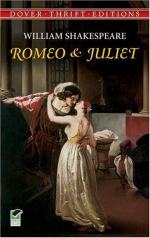|
This section contains 908 words (approx. 4 pages at 300 words per page) |

|
Irony in "Romeo and Juliet"
Romeo and Juliet, was a romantic tragedy occurring in Verona, many hundreds of years ago. The author, William Shakespeare, had many strong points in writing. These included writing in iambic pentameter, creating realistic characters, and making a romantic plot. However, among many of these, was the way he showed irony in this book. His use of irony added great mystery and excitement during this play. One case of irony included in Romeo and Juliet, was verbal irony.
Throughout this book, there are many accounts in which Shakespeare used verbal irony. One being when Mercutio was dying, he announced, "`Ask for me tomorrow, and you shall find me a grave man'" (III. i. 100). After Mercutio was stabbed by the furious Tybalt, he joked around with everyone, so they were not totally sure he was hurt. In this quote, he used the word "grave" as describing himself being gloomy, solemn...
|
This section contains 908 words (approx. 4 pages at 300 words per page) |

|


